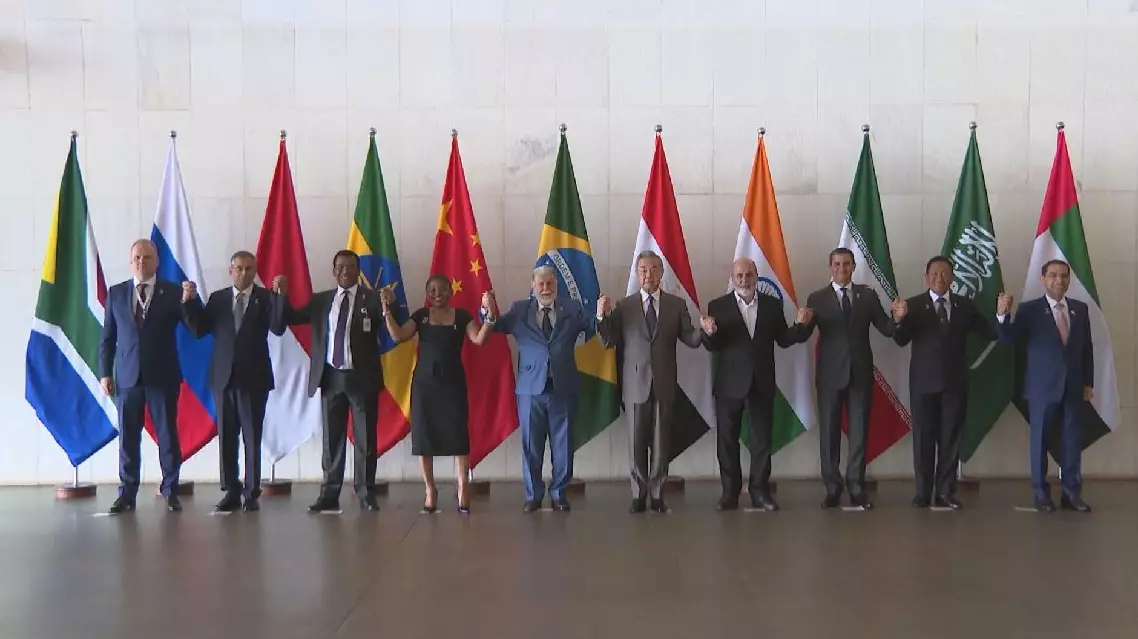A Japanese economist warned that the recent tariff hikes imposed under Donald Trump's administration will disrupt the global economy and ultimately backfire on the U.S.
In an interview with China Media Group (CMG), Sakai Shozaburo, former Chancellor and President of Chuo University, explained that the U.S. developed a finance-driven tertiary industry as part of its economic strategy to establish a dollar-based global financial system. As a result, the country's manufacturing sector gradually declined, a shift that he emphasized was driven by domestic policy decisions, not external influences.
"The U.S. tariffs will lead to a sharp rise in prices, and the economic situation in the United States will deteriorate. Moreover, with fixed purchasing power, any increase in costs will inevitably lead to a decrease in consumption. Simply put, goods will not sell. As a result, prices will rise, but goods will remain unsold, leading to stagflation, a phenomenon in economics," said Sakai. Sakai also warned that U.S. tariffs pose a significant threat to the country's GDP growth.
"[U.S. tariffs] will certainly be opposed by all countries around the world, and they will eventually backfire on the U.S. From an overall economic perspective, prices will rise, which can be described as self-destructive behavior. It also poses a very serious challenge to the growth of U.S. GDP," he said.

Japanese economist warns Trump's tariff hikes will backfire on U.S. economy

Japanese economist warns Trump's tariff hikes will backfire on U.S. economy

Japanese economist warns Trump's tariff hikes will backfire on U.S. economy

Japanese economist warns Trump's tariff hikes will backfire on U.S. economy
Chinese Foreign Minister Wang Yi said on Wednesday that BRICS countries need to strengthen unity and cooperation to act as the most reliable force in safeguarding the legitimate rights and interests of developing countries.
Wang, also a member of the Political Bureau of the Communist Party of China (CPC) Central Committee and director of the Office of the Central Commission for Foreign Affairs, made the statement at the 15th Meeting of BRICS National Security Advisers and High Representatives on National Security in the Brazilian capital of Brasilia.
He stated that once-in-a-century changes are unfolding across the world at a faster pace, with new challenges, changes, and problems constantly emerging.
Yet regardless of how the international landscape changes, peace and stability remain a common pursuit of the international community, development and prosperity are always a common expectation of all countries, and seeking strength through unity among the Global South is always an unstoppable historical trend, he said.
Wang said that under the new global circumstances, more and more countries are willing to listen to the voice of BRICS and hope to join the BRICS family. The development of BRICS represents the growth of peace forces, the strengthening of development forces, and the empowerment of the forces of justice in the world.
BRICS countries must stand at the forefront of the times, strengthen unity and cooperation, demonstrate the assumption of responsibility, and promote the significant role of greater BRICS cooperation, to act as the most reliable force in safeguarding the legitimate rights and interests of developing countries, he noted.
Wang stated that a transactional approach in international politics and weaponizing global trade will only aggravate the trust crisis among countries and jeopardize global security.
Standing at the crossroads of history, BRICS countries must provide a clear answer: should they allow unilateralism to spread unchecked, or steadfastly champion for multilateralism, Wang said.
Concession leads nowhere and unity is where the hope lies, he added.
Wang said that BRICS countries should hold high the banner of multilateralism, take the lead in safeguarding the international system with the United Nations at its core and the multilateral trading system with the World Trade Organization at its core, and promote development of the international order in a more just and reasonable direction.
Other parties at the meeting agreed that BRICS countries should build consensus and make joint efforts to oppose all forms of bullying, interventionism and tariff abuse, adhere to multilateralism, defend the common interests of the Global South, and work together to build a multipolar world of peace, security, fairness and justice.

BRICS countries should become reliable force in safeguarding developing countries' rights: FM
























































